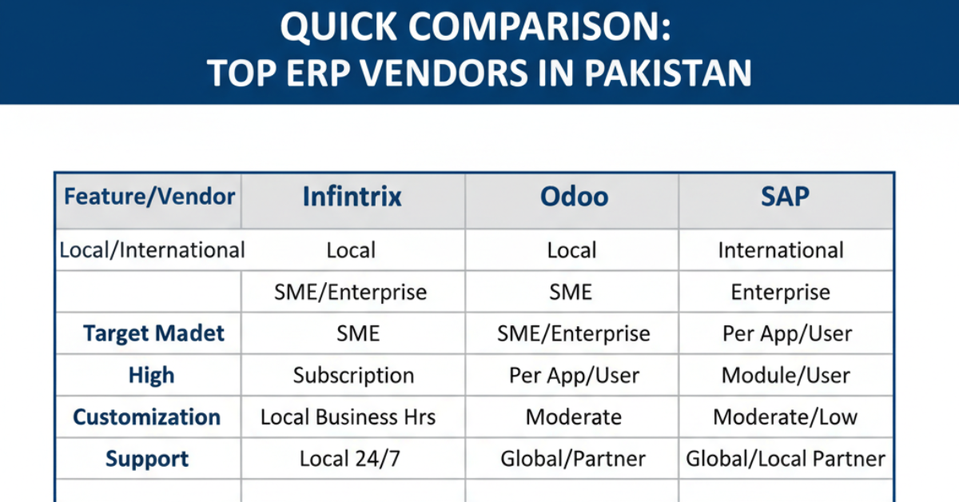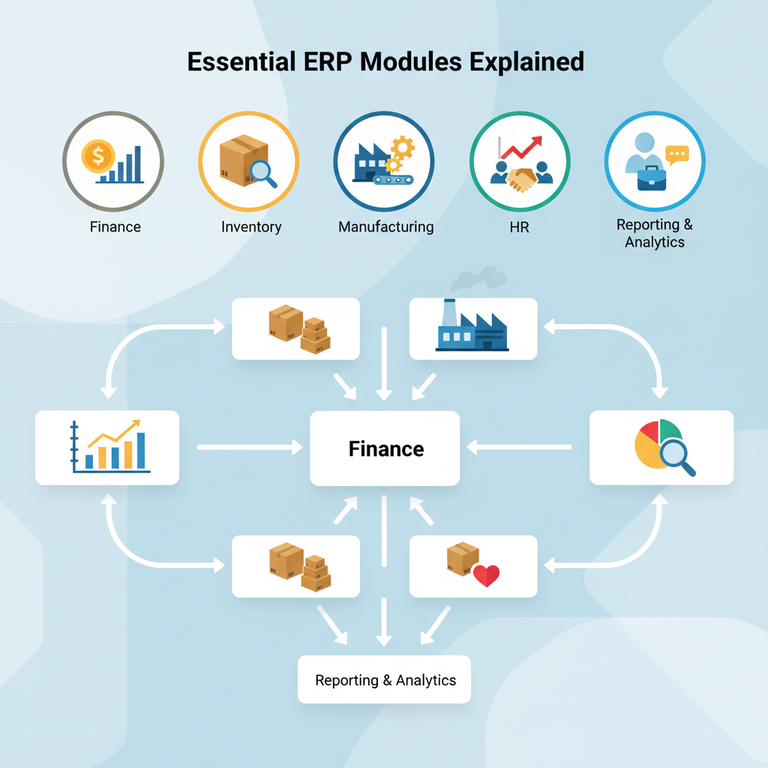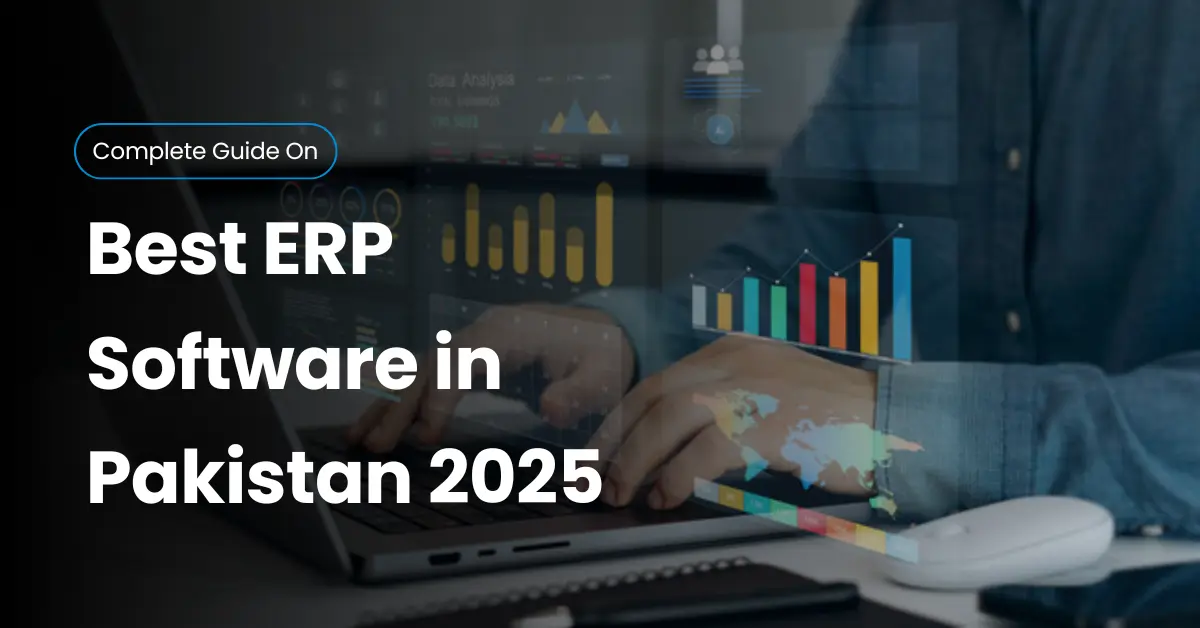Choosing the best ERP service provider in Pakistan can feel overwhelming, especially if you’re comparing vendors from the USA and Pakistan side by side. You’ll see flashy websites, bold promises, and endless lists of features. But what you really need is clarity: which ERP software Pakistan businesses actually trust in 2025, and why.
This guide breaks it all down—pricing, features, industry fit, and even ERP modules Pakistan companies can’t live without. Whether you run a small retail shop in Karachi or a multinational textile unit, you’ll leave with a clear picture of what to expect and how to choose.

Quick Comparison: Top ERP Vendors in Pakistan at a Glance:
Not every business has time to read long case studies. Sometimes, you just want a quick snapshot of ERP vendors in Pakistan—who they are, what they offer, and whether they lean toward cloud ERP vs on-prem ERP in Pakistan. That’s exactly what this section gives you.
Here’s a glance at a few leading players:
| Vendor | Deployment Type | Industries Served | Starting Price | Local Support |
| Infintrix Technologies | Cloud & On-Prem | Manufacturing, Retail | $25/user/mo | Yes |
| Hisaab | Cloud | SMEs, Retail, Services | -Custom Quote | Yes |
| Odoo (Local) | Hybrid/Open Source | Manufacturing, Textiles | -Custom Quote | Yes (partners) |
| ERPNext (Local) | Cloud & On-Prem | Manufacturing, Retail | ||
| SAP Business 1 | On-Prem & Cloud | Enterprises, Multinationals | $$$ Premium | Limited Local |
👉 Quick tip: If you’re running an SME, local ERP providers in Pakistan like Hisaab can save you money and reduce headaches with on-the-ground support.
Leading ERP Providers & Who They’re Best For
With dozens of ERP software Pakistan options out there, it helps to know not just what they do—but who they fit best.
Think of this as “speed dating” for ERP vendors:
Infintrix Technologies → Great for manufacturers and retailers who need both tailored ERP Pakistan options and reliable support.
Hisaab → Designed for ERP for SMEs in Pakistan, with affordable pricing and a friendly UI.
Odoo Partners → Flexible choice for those who prefer open source ERP solutions.
SAP Business One → Best for large enterprises that need deep, complex ERP modules, Pakistan, and global compliance.
That said, don’t just buy based on brand names. Ask about ERP support & SLA in Pakistan—many SMEs discover too late that 24/7 help isn’t included.
Side-by-Side Comparison Table (Features, Deployment, Pricing, SLA)
Sometimes, the easiest way to compare the best ERP service provider in Pakistan is by putting them head-to-head. That way, you see gaps in pricing, deployment, and support at a glance.
| Feature / Vendor | Infintrix Technologies | Hisaab | Odoo (Partnered) | SAP Business One |
| Deployment | Cloud + On-Prem | Cloud | Hybrid/Open Source | Cloud + On-Prem |
| Customization | Low | Medium | High | High |
| Industry Fit | Manufacturing, Retail | SMEs, Retail | Manufacturing, Textiles | Large Enterprises |
| SLA & Support | 24/7 Local | Business Hours | Partner Dependent | Global, Limited Local |
| ERP cost in Pakistan | $$ Low-range | $ Budget | $$–$$$ Flexible | $$$ Premium |
Here’s the takeaway: ERP vendors comparison in Pakistan shows that local players dominate in affordability, while global giants shine in scalability. Your choice depends on scale, budget, and whether you want cloud ERP vs on-prem ERP in Pakistan.
Which Businesses in Pakistan Need ERP?
Not every company needs a full-blown ERP software Pakistan deployment. But if you’re juggling multiple spreadsheets, struggling with inventory mismatches, or frustrated by delayed reporting, it’s a sign you’ve outgrown basic tools. ERP for SMEs Pakistan is no longer optional—it’s a game changer.
That said, industries like textiles, retail, and food & beverage are leading adopters. Why? Because they deal with supply chains, regulations, and high-volume transactions. Even service businesses—consulting firms, logistics providers—are embracing customizable ERP Pakistan to gain better visibility.
Textiles & Apparel — Common Modules & KPIs:
Pakistan’s textile industry is the backbone of exports. ERP helps track production planning, BOMs, and export compliance while monitoring KPIs like on-time delivery and defect rates. Many choose industry-specific ERP solutions with modules tailored for apparel.
Manufacturing & Supply Chain Efficiency:
For manufacturers, ERP isn’t a luxury—it’s survival. From inventory tracking to automated MRP, ERP cuts waste and improves delivery times. The best ERP for manufacturing in Pakistan integrates shop-floor data with real-time reporting.
Retail, Distribution & F&B:
POS integration, multi-location inventory, and fast sales reporting make ERP a natural fit for retail. In food & beverage, ERPs help manage perishables, batch numbers, and compliance. Many SMEs start here with scalable ERP solutions in Pakistan that grow with them.
SMEs vs Enterprises: Scale & Budget Considerations:
ERP isn’t one-size-fits-all. SMEs usually pick cloud ERP Pakistan tools like Hisaab because they’re affordable and easy to deploy. Enterprises lean toward SAP or Oracle, prioritizing scalability and advanced ERP modules in Pakistan—but at a much higher cost.
Essential ERP Modules Explained:

Every business asks: “What exactly comes inside an ERP?” Think of it like a toolbox. Each module solves a specific business headache, and together they form a connected system. The best ERP services in Pakistan usually include finance, HR, inventory, CRM, and industry-specific add-ons.
When comparing the ERP features list in Pakistan, don’t just tick boxes. Ask how deep the module goes, how well it integrates with others, and if it adapts to your workflows. After all, a customizable ERP Pakistan beats a generic one any day.
Finance & Accounting — Reports You Can’t Miss
Finance is the heartbeat of any ERP. Expect GL, AR/AP, cash flow, and FBR tax compliance. The best solutions in Pakistan automatically generate sales tax invoices and connect with banks. Pro tip: Look for ERP vendors that provide localized reporting for Pakistani regulations.
Inventory & Supply Chain — Multi-Warehouse Made Easy
Running multiple warehouses in Karachi, Lahore, or Faisalabad? Without ERP, it’s chaos. A strong inventory management module tracks stock levels in real time, helps reduce dead stock, and smooths purchasing. Many ERP modules in Pakistan now include demand forecasting too.
Manufacturing & BOM — Smarter Production Planning
Manufacturers depend on ERP for bill of materials, work orders, and material requirements planning (MRP). Instead of guessing, you get real-time visibility into production stages. This is why the best ERP for manufacturing in Pakistan always emphasizes shop-floor integration.
HR & Payroll — Statutory Compliance in Pakistan
Managing people isn’t just about salaries. The HR module in ERP software Pakistan covers EOBI, tax deductions, and attendance tracking. It saves hours of manual reconciliation and ensures compliance with labor laws. For SMEs, this is often the first module they adopt.
CRM, Sales & POS — From Leads to Loyalty:
ERP isn’t only about back-office work. With CRM and POS modules, you can track leads, manage pipelines, and even run loyalty programs. Retailers in particular rely on ERP modules in Pakistan that unify online and offline sales. This is where ERP shows its customer-facing side.
Deployment, Integrations & Security Considerations:
One of the biggest decisions you’ll make isn’t about features—it’s about deployment. Should you go for cloud ERP vs on-prem ERP in Pakistan? Cloud is faster to deploy, cheaper upfront, and easier for SMEs. On-prem is still popular with large firms that need data residency and deeper control.
Equally important are integrations. The best ERP services don’t work in isolation. They connect with banking, payroll, ecommerce, and FBR tax systems. And don’t overlook security—ask vendors about ISO certifications, backups, and encryption before signing any deal.
Cloud vs On-Prem ERP — Which Is Right for You?
Cloud ERP shines for SMEs that need speed, affordability, and mobility. On-prem ERP works better for enterprises that demand total control, customization, and long-term ERP deployment options in Pakistan. Some even choose hybrid setups for the best of both worlds.
Key Integrations: Banking, Payroll, E-commerce & FBR
A good ERP isn’t just internal—it plugs into Pakistan’s ecosystem. That means ERP integration with FBR/tax systems, payroll tools, ecommerce shops, and even POS hardware. Without these, you’ll spend hours manually moving data, which defeats the point of automation.
Security & Compliance: What to Demand from Vendors
Data security is non-negotiable. Ask about ERP support & SLA in Pakistan, encryption, backups, and whether your data stays within local servers. For industries like banking or healthcare, compliance isn’t optional—it’s the deciding factor when choosing a vendor.
ERP Pricing in Pakistan: What to Expect
When it comes to buying the best ERP services in Pakistan, price is usually the first (and scariest) question. The truth? ERP cost in Pakistan varies widely depending on vendor, deployment type, and business size. Some SMEs pay as little as $20/user per month, while enterprises spend six figures annually.
That said, pricing isn’t just about licenses. Hidden costs—like training, integrations, and support—can add up fast. This is where knowing the different pricing models helps you plan smarter and avoid surprises.
Common Pricing Models (Subscription, Perpetual, Per-User)
Vendors in Pakistan usually follow three models:
- Subscription (SaaS): Monthly or annual fees, great for SMEs.
- Perpetual License: One-time fee plus annual maintenance.
- Per-User Pricing: Scales with headcount, common in ERP software in Pakistan deals.
👉 Tip: Ask vendors to explain what’s included in each tier to avoid hidden fees.
TCO Example: 3-Year ERP Investment Breakdown
Here’s a simplified example of ERP cost in Pakistan for a mid-sized business:
| Cost Element | Year 1 | Year 2 | Year 3 | Total |
| Licenses / Subscription | $7,500 | $7,500 | $7,500 | $22,500 |
| Implementation | $12,500 | – | – | $12,500 |
| Support & Training | $3,000 | $3,000 | $3,000 | $9,000 |
| Customization | $5,000 | $1,500 | $1,500 | $8,000 |
| Total TCO | $28,000 | $12,000 | $12,000 | $52,000 |
Notice how, with ongoing ERP support & training, Pakistan can quickly become a major line item. That’s why negotiating SLAs upfront is critical.
Fixed Bid vs Time & Materials: When Each Makes Sense
- Fixed Bid → Safer for SMEs with limited budgets. You know the exact ERP implementation cost.
- Time & Materials → Better for enterprises that need a customizable ERP in Pakistan with complex workflows. Flexible, but riskier if scope creeps.
👉 Rule of thumb: If your requirements are crystal clear, go fixed. If not, choose T&M but demand strong reporting.
ERP Implementation Roadmap for Pakistani Businesses:
Buying ERP is one thing—rolling it out is another story. Many underestimate the effort and end up frustrated. A realistic ERP implementation timeline in Pakistan can stretch from 3 months for SMEs to over a year for enterprises. The key is breaking it into clear phases.
Each stage—requirements, configuration, testing, and support—matters. Skip one, and you risk project failure. With the best ERP services in Pakistan, vendors usually guide you through these phases, but knowing what to expect helps you manage the process better.
Discovery & Requirements (2–6 weeks)
This is where your ERP journey starts. Workshops and interviews help define needs—everything from ERP modules in Pakistan you’ll use to integration with FBR. SMEs often wrap this up quickly, while enterprises spend more time aligning across departments.
Configuration & Customization (4–12 weeks)
Now the vendor tailors the system. Expect setup of finance, HR, inventory, and any customizable ERP Pakistan workflows. More complex industries—like manufacturing or textiles—usually require heavy configuration. Don’t rush this step; it sets the foundation.
Testing, Training & Go-Live (2–6 weeks)
Before launch, your team tests real data in the system. Vendors provide ERP support & training Pakistan sessions, covering everything from payroll to reporting. Once users feel confident, you’re ready for go-live. Pro tip: Schedule this during a low business cycle to reduce stress.
Post Go-Live Support & Continuous Improvement
Implementation doesn’t end at go-live. Ongoing support, bug fixes, and user feedback loops keep your ERP useful long-term. The smartest companies treat ERP as a living system—adding modules, refining workflows, and scaling as they grow.
Case Studies: ERP Success Stories in Pakistan
Nothing proves the value of the best ERP services in Pakistan like real results. These case studies show how companies across manufacturing, retail, and services improved efficiency, cut costs, and boosted ROI. If you’re wondering whether ERP is worth it, these examples speak louder than vendor brochures.
Each one highlights measurable before-and-after improvements. From reduced lead times in factories to smarter retail inventory management, ERP is reshaping how Pakistani businesses operate.
PakTools — Manufacturing: Boost Business Efficiency
Pak Tools' mid-sized textile mill in Faisalabad struggled with delayed shipments and overstocking. After implementing a customizable ERP Pakistan solution, production planning synced with real-time inventory. Lead times dropped by 30%, while order accuracy improved significantly. This became their edge in export markets.
LeatherLab— Retail: Improved the Inventory Rollout
LeatherLab, a retail online store that works and manages its business in Lahore, faced frequent stockouts. Switching to cloud ERP Pakistan allowed them to track inventory across all locations. Within six months, their inventory turnover ratio improved by 25%, and POS data fed directly into purchasing decisions.
ERPLeaf — Services: SAAS/ White Label ERPNext
ERPLeaf, a service provider company in Lahore, reused spreadsheets for billing, leading to revenue leaks. ERP solved this by automating timesheets, project tracking, and invoicing. As a result, utilization rose 15% and billing accuracy jumped. For services businesses, this kind of ROI is hard to ignore.
ROI Calculator & ERP Buyer’s Checklist
Investing in ERP feels like a big leap, but seeing the numbers helps. A simple ROI framework can show how the best ERP services in Pakistan pay for themselves through cost savings, reduced errors, and productivity gains. Beyond that, a checklist keeps you sharp when talking to vendors.
Think of this as your “ERP survival kit”—one part math, one part due diligence.
ERP ROI Calculator — Estimate Your Savings
Here’s a quick way to calculate ROI:
- Add up savings from reduced labor hours, lower inventory holding, and fewer errors.
- Subtract ERP cost in Pakistan (licenses, implementation, support).
- Divide savings by cost = ROI %.
Example: A company saves $50,000 annually after ERP, but spends $20,000. ROI = 150%. That’s the kind of metric CFOs love.
10 Questions to Ask Before Signing with a Vendor
When shortlisting ERP vendors for comparison in Pakistan, don’t just look at features. Ask questions like:
- What’s included in the SLA?
- How does your ERP handle integration with FBR?
- Can it scale as my business grows?
- What’s the ERP implementation timeline in Pakistan?
👉 Pro tip: Print a PDF checklist so you won’t forget these during vendor demos.
FAQs — Buying ERP in Pakistan
Q1: What are the best ERP services in Pakistan for 2025?
Ans: Top providers include Infintrix Technologies, Hisaab, ERPNext & Odoo partners, and SAP Business One. Each suits different industries and budgets.
Q2: How much does ERP cost in Pakistan?
Ans: Cloud ERP starts around $20–$30 per user/month for SMEs. Enterprise solutions like SAP can cost significantly more, often requiring custom quotes.
Q3: Which industries benefit most from ERP in Pakistan?
Ans: Industries like textiles, manufacturing, retail, and food & beverage benefit most due to complex supply chains and compliance needs.
Q5: Can ERP systems in Pakistan integrate with FBR tax systems?
Ans: Yes, many ERP vendors in Pakistan provide FBR tax integration for automated invoicing and compliance reporting.
Q6: What is the typical ERP implementation timeline in Pakistan?
Ans: SMEs usually take 3–6 months, while large enterprises may need 9–12 months, depending on customization and the number of modules.
Q7: Do SMEs in Pakistan really need ERP?
Ans: Yes. SMEs adopt ERP to replace spreadsheets, improve reporting, and manage multi-location inventory more effectively.
Q8: Which ERP modules are most important for Pakistani businesses?
Ans: Finance, inventory, HR & payroll, manufacturing, and CRM are the most requested ERP modules that Pakistani businesses prioritize.

